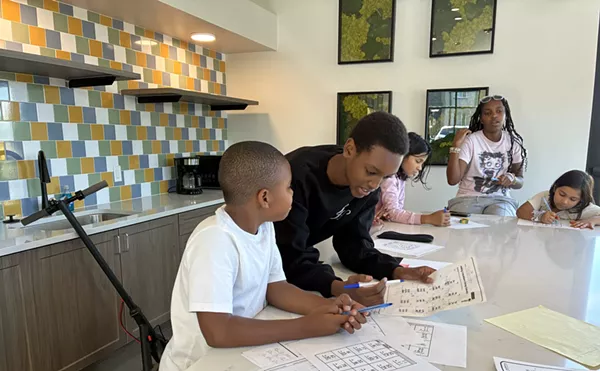While simplified dissolution is sweeping the state, Gutterman is advocating an even newer concept: collaborative family law. This alternative calls for husband and wife to each hire an attorney and, if need be, neutral experts such as accountants and real estate appraisers. Before the collaboration can begin, the couples, lawyers and experts must all sign a stipulation stating that they'll work together to reach a settlement without going to court. If negotiations break down and the spouses decide they must litigate, the lawyers and experts step down and the case starts all over. That way, everyone has incentive to settle.
The system sounds appealingly simple -- but a lot of lawyers believe the courtroom is the best forum for handling divorce. That's because in court, their clients are afforded every right of due process; through discovery, one spouse can find out if the other is hiding any assets, and if the couple can't agree on how much a house is worth, the wife can hire one appraiser, the husband another, and the judge will make the final decision.
Although they won't admit this, there's another reason some attorneys don't like collaborative family law: It's supposed to be faster, and that means no more months-long -- or even years-long -- cases at $250 an hour.
"This shift to non-adversarial methods is so threatening to lawyers who are used to being in the court system that it has caused our firm to break up," says Gutterman, a member of the Commission on Families in the Colorado Courts.
Gutterman introduced collaborative family law to Colorado through the law firm that used to be known as Gutterman, Carlton and Heckenbach. But even attorneys at her firm had problems with the concept. "One of the attorneys has a knight in shining armor in his office, and that's exactly what he is and what his clients want him to be," she says. "There is definitely a need for the go-to-court, adversarial pit-bull lawyer."
But that's not what Gutterman wants to be. "The escalation of feelings and the horror stories I saw in court really bothered me," she says. So when she heard about collaborative family law, she was intrigued. Minnesota attorney Stuart Web is credited with coming up with the idea in 1990; after working well with other lawyers on divorce cases that resulted in satisfactory settlements, he thought it would be nice if that could happen more often. "He's a Buddhist and has peaceable attitudes," Gutterman explains, "and he said, 'How can I deliberately create an environment where lawyers sit down and settle?' He decided he'd only take cases on a settlement basis."
The concept caught on in San Francisco and then spread to other parts of California; collaborative family law soon became popular in Texas, the first state to codify the process under statute. "California will probably pass legislation soon, and we'll probably see laws to protect this option in most states," Gutterman says.
It's still very new to Colorado, however. In January 2000, Gutterman attended a training workshop on collaborative family law in Arizona, and in November of that year, she invited Pauline Tesler, author of Collaborative Law: Achieving Effective Resolution in Divorce Without Litigation, to Colorado to train attorneys here on the concept. The courtroom alternative started generating interest, and it gained prominence this past January with the formation of Colorado Collaborative Family Law Professionals, an association of approximately fifty attorneys, real estate appraisers, accountants and other experts who believe in an out-of-court, team approach to settling divorces.
Geoff Parker is a member, and almost everyone at the law firm where he works has been trained in collaborative family law; Mary Jane Truesdell Cox, a partner in the firm, helped Gutterman found the CCFLP and now chairs the organization. But not all family-law attorneys wish to collaborate, Parker says, "because it takes a mind shift and a commitment to resolving divorce without going to court, and it takes a lot of trust between attorneys to do that."
"Lawyers aren't trained to collaborate. When we go to law school, we're trained to fight," Gutterman explains. "Our mandate is to win. The mandate in collaborative law is to compromise. A lot of lawyers are outraged by this new process. There is definitely a rift out there."
The rift in her law firm became permanent last month, when it finally split in two. Gutterman and Suzanne Griffiths went one way, the rest of the lawyers another.
Dave Heckenbach, the attorney with the knight in his office, insists that collaborative family law didn't factor into the firm's breakup (although he won't say what did), but he admits having reservations about the new method. "Although it's a nice, feel-good concept, many times these cases blow up halfway through, and people end up wasting a bunch of time and money because they have to hire a whole new set of attorneys and experts," he says. "As an attorney, you need to be respected as a litigator, because if you're afraid to go into a courtroom, you can end up getting walked on by the other side. Obviously, I'm a big fan of the courtroom; I mean, my license plate says 'litigator.'"
Diane Carlton, another partner in that former firm who currently chairs the Colorado chapter of the American Academy of Matrimonial Lawyers, says she's not opposed to collaborative family law in principle, but to the way it's sometimes presented. "I'm a trial lawyer, and I'm the first to say that settlement is better, but I don't like it when the lawyers marketing collaborative law say trial work is bad," she says. (Gutterman hasn't done that, she adds.) On a family-law e-mail list to which Carlton subscribes, she recently read several postings from local attorneys lambasting their peers who try divorce cases in court. "One of them said, 'You gladiators: Find other ways to do cases,'" she remembers.
But when clients come to her, she doesn't pressure them to choose collaborative law, Gutterman says: "I try to neutrally educate them about the benefits and drawbacks of collaborative law, simplified dissolution, mediation, arbitration and the traditional court system."
In fact, she still litigates 30 percent of her cases, and partner Griffiths does trial work exclusively. Because the concept is so new, collaborative cases account for only 10 percent of Gutterman's workload now; the rest go through simplified dissolution, mediation or some other form of alternative dispute resolution. So far, she says, none of her collaborative family-law clients have abandoned the process for litigation. And of the 300 mediations she's facilitated, only two have failed.
Gutterman recognizes that not all cases can be settled out of court, especially those involving domestic violence or child abuse. Where appropriate, though, she wants people to consider the alternatives. And she says the principles of medicine should apply to the law, too. "Family law should have something like the Hippocratic Oath: First, do no harm," she says. "You should always try the least invasive procedure first. Just as you don't go to the emergency room unless there's a health emergency, so, too, should you try something else before going to court."










